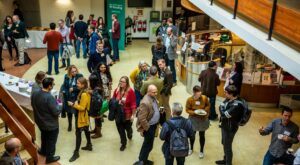 The University of Reading and The Natural History Museum, London, home to a vast range of life and earth science specimens, have entered into an exciting long-term research collaboration.
The University of Reading and The Natural History Museum, London, home to a vast range of life and earth science specimens, have entered into an exciting long-term research collaboration.
Inspired by the planned move of 28 millions specimens from the Museum’s collections to an ambitious new science and digitisation centre on the Thames Valley Science Park (TVSP), the partnership provides a framework for joint initiatives which align with the specialisms and aims of both institutions.
This is a collaboration agreement at institutional level, which goes beyond the development at TVSP to form a strategic partnership and covers areas such as:
- development of joint education and training provision, research proposals and postgraduate opportunities
- mutual access to and potential development of research infrastructure
- delivery of joint events to highlight research synergies
- exploration of potential innovations to improve professional and public engagement with each institution’s Collections
- collaboration to deliver benefit to the communities around TVSP and in the wider local area
Governance
Joint Governance Board membership
University of Reading:
Dominik Zaum, Pro-Vice Chancellor (Academic Planning and Resource)
Tom Oliver, Associate Pro-Vice Chancellor – Research (Environment)
John Gibbs, Associate Pro-Vice Chancellor – Research (Heritage and Creativity)
Charlotte Johnson, Senior Research Development Manager
Beth Steiner, Research Facilitation Manager
Natural History Museum:
Tim Littlewood, Director of Science
Ken Norris, Research Leader in Biodiversity Change
Caroline Smith, Head of Collections
Emma Hayes, Programme Director (NHM Unlocked)
Paola Ricciardi, Research Themes and Partnerships Manager
Priority Areas
The partnership aims to make progress aligned with the specialisms and goals of both organisations, against five priority areas:
- Priority Area 1: Research and Innovation
Encourage and support research and innovation in areas of mutual strategic interest; drive collaborative impactful research focusing on solutions to the global polycrisis; collaborate in engaging with the UK and global research agenda
- Priority Area 2: People
Support professional development of staff maximising opportunities offered by the Partnership; increase collections-based research opportunities; drive collaboration and sharing of expertise and experience across the two organisations and wider TVSP networks
- Priority Area 3: Skills
Enhance the student learning experience; support development of students maximising opportunities offered by the Partnership; increase collections-based teaching and learning opportunities
- Priority Area 4: Infrastructure
Facilitate shared access to existing research infrastructure; identify future facility needs; jointly develop cases for purchase of equipment
- Priority Area 5: Audiences and Collections
Support and develop programmes to increase high-quality professional and public engagement with collections; support collaborative work to remain at forefront of approaches to collections research, engagement and impact
